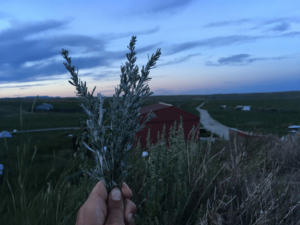 Today marks our 100 mile mark on our 700 mile journey through Montana. After our 42 mile ride, we coasted down the Main Street hill into Roundup, passing by lines of cracked windshields and tall grasses growing through the pavement.
Today marks our 100 mile mark on our 700 mile journey through Montana. After our 42 mile ride, we coasted down the Main Street hill into Roundup, passing by lines of cracked windshields and tall grasses growing through the pavement.
So far, I have realized the importance of bringing together community members and making connections with people with different jobs, values, and environmental philosophies. To me, community organizing is a way to bring people together without barriers of economic statuses, political affiliation, or any other potential threat to personal connection. Over the past few years, I have become more aware of the positive impacts on my well-being that come with forming deep personal connections. Connection with other people, places, and wild things are essential to gaining a sense of our lives and other’s lives in the world.
In Billings, Montana we spoke to Mike Scott, the owner of a beautiful ranch on the Yellowstone River. Mike was dependent on building connection within his community in order to rebuild his livelihood. He and his partner relied on the support of their neighbors and the strength of cultivated passions to get themselves through a fossil fuel nightmare. About five years ago, an Exxon pipeline running under the Yellowstone River was struck by a tree carried by a surge of flood water. The pipeline leak seeped onto their land. Oil stains on the towering cottonwood trees still remain. These effects showed on most of their neighbor’s properties, prompting Mike and Alexis to rally their neighbors to take a stand against Exxon.
The group of neighbors that gathered all had different reasons to be concerned; some were landowners worried about the vitality of the land, some were conservative Republican ranchers, others were Greenpeace activists, and then there were folks like Mike and Alexis– concerned about the health of the land, the community, and the economic impacts on their livestock farms. Mike touched on how this process of gathering his neighbors opened his eyes to the various perspectives of his community, he saw a new light in their voices and gained a newfound empathetic heart.
Some of the neighbors however, were hesitant to fight against a company as large as Exxon and readily accepted the minimal $3,000 payout which Exxon offered for land reparations. Together, the neighbors were able to push Exxon for greater compensation towards the severe damage to their properties. This demonstrates the importance of collectivity and strength in numbers.
Later in the week, I found myself in the basement of Saint Benedict’s Catholic Church in Roundup, population around 1,800. Before touching down in Roundup, we ascended up 15 miles of hills to reach Signal Peak Coal Mine. As an Environmental Studies major who wants coal to be eliminated, I felt uncomfortable and unwanted when we first arrived, but the coal workers welcomed us with stark white eyes and coal dusted arms. This welcoming sight allowed for my preconceived notions to melt away. I enjoyed hearing about their experiences working at Signal Peak and almost all of them said that the tight community was their favorite part of the job. They were all supporting their families while working in a coal mine that prides itself on safety standards and efforts to keep the coal “clean.”
After a long day of walking around in steel toed boots, we settled down in the church to a 3,000 calorie meal cooked for us by a group of strangers. Community members joined us for our meal and a dinner discussion about our recent tour of Signal Peak. Our conversation caught the attention of a woman whose eyes shined through her smile, wrinkles on her gently weathered face. She was instantly interested in our discussion of coal. She said how well the company treated the town and how incredibly thankful she is to benefit from it. She said the tax revenue brought in by Signal Peak was able to build two schools, a church, and help to fund the hospital where she works as a nurse. An interesting note to this is that Signal Peak coal mine exports 98% of its coal to markets overseas, leaving only 2% to domestic sales. This influx of money greatly supports the community, and their reliance on Signal Peak is a sensitive situation that will eventually require a smooth transition when coal fades out and renewables move in.
Understanding differing opinions really challenges the way I think about the future of renewable energy and the decline of non-renewables. I hope to keep seeing different sides of people’s lives, what they support and why they do what they do. Through the experience of this bike tour, I have felt so immersed in the lives of people I would’ve never known and I am now carrying around little pieces of their world views.